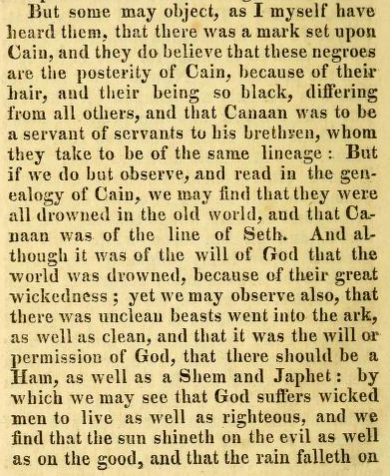Elihu Coleman explains that the belief that Black people are descended from Cain was common.
- Type
- Book
- Source
- Elihu Coleman Non-LDS
- Hearsay
- Direct
- Reference
Elihu Coleman, A Testimony against the Antichristian Practice of Making Slaves of Man (New Bedford: Abraham Shearman, 1733), 16
- Scribe/Publisher
- Abraham Shearman
- Audience
- Reading Public
- Transcription
But some may object, as I myself have heard them, that there was a mark set upon Cain, and they do believe that these negroes are the posterity of Cain, because of their hair, and their being so black, differing from all the others, and that Canaan was to be a servant of servants to his brethren, whom they take to be of the same lineage: But if do but observe, and read in the genealogy of Cain, we may find that they were all drowned in the old world, and that Canaan was of the line of Seth. And although it was of the will of God that the world, because of their great wickedness; yet we may observe also, that there was unclean beasts went into the ark, as well as clean, and that it was the will or permission of God, that there should be a Ham, as well as a Shem and Japhet: by which we may see that God suffers the wicked men to live as well as righteous, and we find that the sun shineth on the evil as well as on the good
- Citations in Mormonr Qnas
The B. H. Roberts Foundation is not owned by, operated by, or affiliated with the Church of Jesus Christ of Latter-day Saints.

